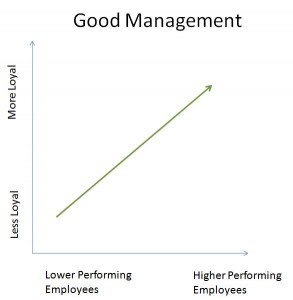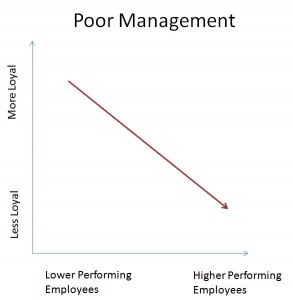Why asking for loyalty discourages high performers
Many managers value loyalty in their employees, and even state it up-front as something that they expect. In my previous post, I discussed some of the dangers that asking for loyalty can create. In today’s post, I’d like to focus on what asking for loyalty does to high performers. In this scenario, the new manager declares, “I value loyalty” to their team.
If the manager announces this to the team, here is what the high performers (those who align themselves to the org strategy, create quality work output, and add value to the organization) are likely to interpret this:
Oh brother, this has nothing to do with work quality.
The higher performers know the people who are more loyal to management who values loyalty—the lower performers.
The high performers on the team will see this dynamic develop: The lower performers hear that their new manager values loyalty. They are the ones who are looking for ways to enhance job security without having to perform the actual job well, and loyalty is something that does not require good work that brings value to an organization. It requires instead actions that indicate loyalty: sticking around, agreeing with your ideas and decisions, staying at work until the boss leaves. These actions are not necessarily work that adds value to your team or organization.
The low performers in getting work done are suddenly high performers in the area of convincing you that they are loyal to you. They’ll feed you only information that you want to hear, and not information about the real state of the organization. They’ll agree with your ideas, rather than improve upon your ideas or offer better ideas. They’ll convince you, through their loyalty, that they are the top performers, when they are the top performers in only one area: being loyal to you.
The fact that this could undermine your team performance is one problem. But there’s another problem with declaring you value loyalty:
Let’s say you discover that your most loyal employee—the one who has been in the organization the longest, the one who has dutifully supported your decisions–is revealed to be performing very poorly (which is a likely scenario—since loyalty is their top priority—not getting work done). This loyal employee doesn’t get any work done, is late on everything, or even uses their status as the “most trusted” employee to bully others to their way. (There are lots of ways a loyal employee can be an exceptionally poor performer, these are just a few).
You now have to provide performance feedback to improve their performance, or put them through the performance management process, or even need to let go of the employee. But if you do this, you are going against your stated values that put loyalty front and center. And your values now are revealed to go against basic expectations for what a manager is supposed to do. This means that you are not able to do your job as manager, and the organization, once it figures this out, will not be loyal to you.
You want to create the dynamic where the poor performers are not encouraged to stay, and the top performers are encouraged to stay:
So don’t ask for loyalty from your team, because this is a leading indicator to your top performers that you are in the “bad manager” camp, and they will be less loyal.
What to do instead? Instead of stating that you value loyalty, state what you are going to do to improve the organization, and focus on what you expect the employees to do. Make sure what you ask them to do are not behaviors that undermine your management ability, but instead enhance your management ability. If you must be succinct, ask your employees to do things like, “Strive toward the truth,” “Drive the organization forward,” and “Create a positive working environment,” “Identify ways for improvement.” This is not an exhaustive list (feel free to add some to the comments!). However, these are things that, when translated to day-to-day behaviors or interpreted into action by your employees, turn into leading indicators of a high-performing team. If you focus on these things, you’ll earn that much-sought loyalty from the top performers, and be “abandoned” by the lower performers, rather than vice versa. The better your management skills, the more you’ll get loyalty from those you want loyalty from:
For you management designers out there, think about how your management design works to avoid creating “cringe-worthy” announcements that many managers make that inadvertently encourage poor performance and discourage good performance.
Keep reading this blog to identify behavior based-language that generates the performance you want, and add to conversation in the comments where you see “values” inadvertently rewarding low performance, and punishing high performance.

